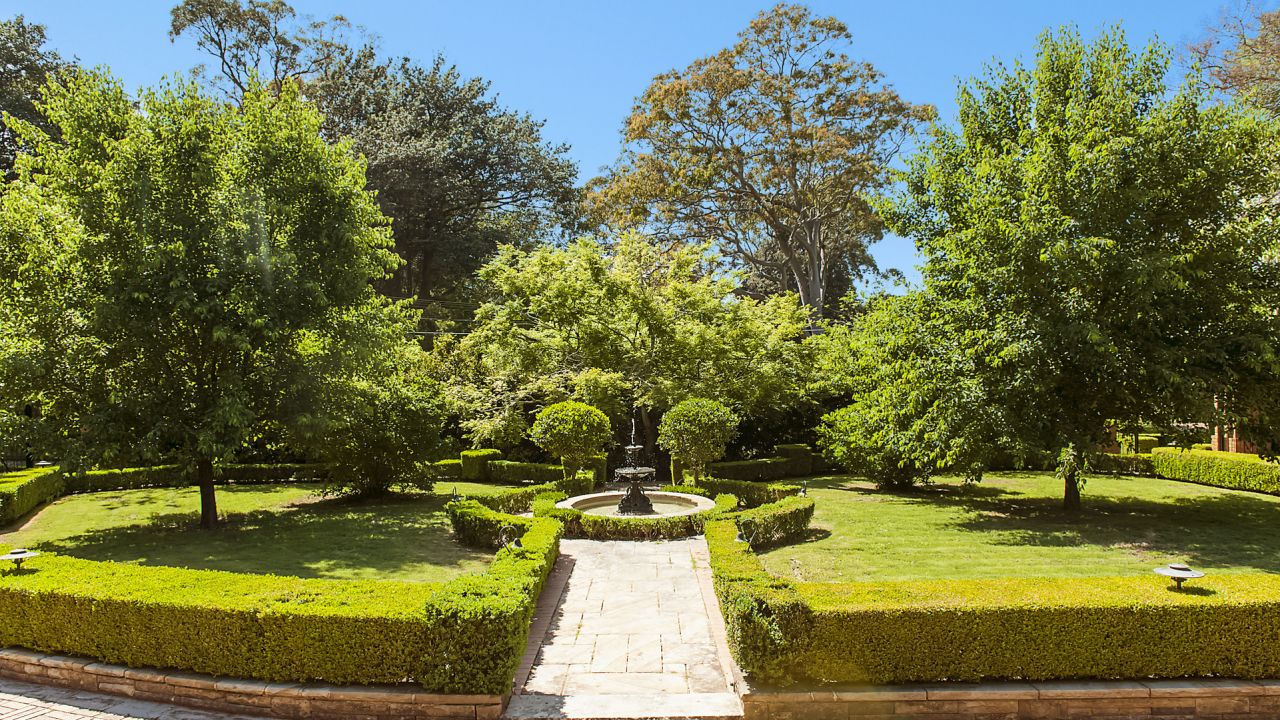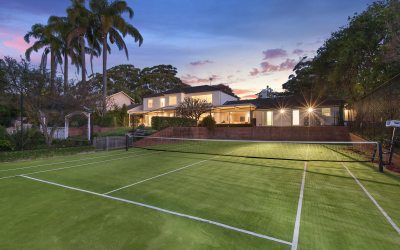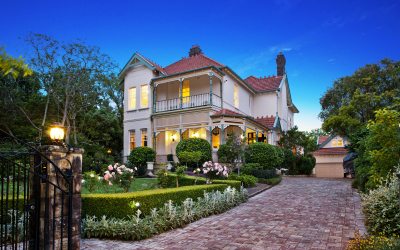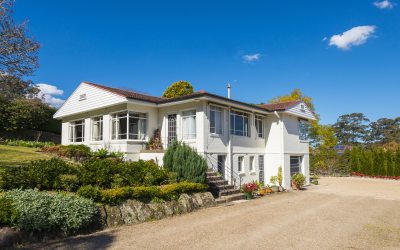A well nurtured, carefully presented garden will certainly add significant value to your home when it comes time to sell.

When most people think of North Shore gardens, images of luscious, leafy plants, flowering camellias, perfectly manicured hedges, large deciduous specimen trees and neatly swept sandstone drives, all framed by a perfectly clipped lawn are probably conjured in their minds. These are definitely key elements in many a North Shore garden, but how are they achieved and maintained?
A well nurtured, carefully presented garden will certainly add significant value to your home when it comes time to sell. Sadly, these things take time and care to achieve and often aren’t instantly attainable even with unlimited funds – time must be taken to plan and wait for plants to grow. Speaking from personal experience when life gets especially busy the garden can take a back seat and suffer – the weeds can grow, plants don’t get the nourishment they require and general TLC.
I spoke to Jim Reed, Director of Reliable Property services to understand what is involved to maintain a beautiful garden and lawn, two essential elements of most North Shore properties. His company offers a full garden maintenance programme, small landscaping works, installation of “mains powered” and battery operated irrigation systems as well as wholesale tidying of properties when they are being prepared for sale. His company has an excellent long standing relationship with Luschwitz.
Q. What recommendations and general comments do you have for lawn care? [GL]
A. “A typical mowing schedule would provide for 9 months of fortnightly mowing from September to May and monthly to 6 weekly during June, July and August. The frequency of mowing depends to a great extent on the property owner/tenant. If they entertain regularly or are more fastidious with the presentation of their property then the lawns are mown weekly particularly during the warmer months. For these clients we generally raise the height of the cut as we are aware that we will be returning the next week before the grass gets too long. In winter time however, even they reduce to a fortnightly service whilst others will stretch to 5 to 6 weeks during the colder months. As a rule, the more frequent the mowing the thicker the lawn should become and if this is desired we can use a mulching plate which throws the cuttings down into the nap of the grass.
We fertilise lawns twice annually, generally with a slow release fertiliser which can be effective for some months. Where lawns have runners growing across the surface we recommend they be cored or de-thatched and then top dressed and fertilised. Most of the more prominent grasses in the Sydney area are quick growers and when treated correctly provide a good presentation. Watering of lawns is critical to their wellbeing and whilst properties on Sydney’s Upper North Shore generally receive a good volume of natural water annually, there are times when it is necessary to supplement rainfall. We prefer to spray lawns twice annually to inhibit weed growth however in some circumstances this is required more frequently particularly if onion weed is present." [JR]
Q. What are your recommendations for looking after plants? [GL]
A. “Some plants such as Buxus, Lilli Pilli, Murraya and other quick growing shrubs and hedges need trimming up to 4 times annually whilst others such as Camellias only require trimming twice annually. As a rule with smaller leafed plants, the more frequent the pruning the more dense the plant (hedge) becomes. In addition to promoting the health of the plant, most of our clients see this approach as providing a better presentation of their property for longer periods of time.
A most important factor when dealing with plants and hedges is to ensure that they remain free of pests and that they are regularly fertilised. Generally speaking we usually fertilise all garden beds twice annually with a slow release fertiliser. Some plants are fertilised more frequently to enhance strength of the plant and colouring of blooms but this depends on the level of presentation our clients require.” [JR]
Q. Is mulching of garden beds really that worthwhile? [GL]
A. “Yes. We generally recommend mulching of all beds for the following reasons:- It provides a good cover to diminish weed growth thereby saving on maintenance costs. It helps to retain moisture at ground level and below, which plants need to encourage growth and health. It always makes for a better presentation of the property. Each garden is different as some plant types need more frequent mulching and others require different mulch types." [JR]
Q. How do Homeowners achieve weed free garden beds? [GL]
A. “Where practical we remove weeds by the roots using a fork. We are conscious of the need to be careful when removing heavy weed infestation as it is essential not to damage roots of surrounding plants but this does have an impact on the time taken to effectively complete this type of work. Where leaf litter is allowed to remain on the garden bed and becomes too deep it needs to be thinned out as it can prevent water getting to the roots of the plants thereby denying them of sustenance.” [JR]
Q. What are your thoughts on Irrigation Systems Jim? We adore ours, with our busy lifestyle its comforting to know the plants will get watered! [GL]
A. “We generally suggest to our clients that they irrigate their lawns and gardens. If “hard wired” systems are installed and attached to the main power system they can be rather costly but these systems can be programmed and left for months if necessary. These programmers contain a battery which retains the schedule for some time in the event of a power outage. They also generally have a broader programming variation. Battery operated systems are also very effective but generally have a limited programming arrangement and have to be monitored for flat batteries. If the property is to be vacant for any period I recommend changing batteries prior to departure. All plants and lawns need irrigating throughout the year and this is the most effective manner in which that can be achieved. Failure to regularly irrigate can be detrimental to their health and will result in a poorer presentation.” [JR]
Q. What can be done to treat pests? [GL]
A. “There is a considerable area of Native bushland in the Upper North Shore and residents should be aware of penalties for damaging Native Flora and Fauna. This is particularly so when using Insecticides and Pesticides.
In some of these areas we see Wallabies, Kangaroos and Bush Turkeys. The only effective way to keep them from damaging property is to surround important plants with sufficient guards to ensure they cannot get to the plants. So far as general pests and insects are concerned there are treatments which can be used without causing harm to wildlife.” [JR]
Many thanks to Jim Reed, Director of Reliable Property Services Pty Ltd 0421-279-098 for providing us with this incredibly useful advice and insight into gardening on the North Shore.
Written by Gemma Luschwitz - self professed garden lover.
by Gemma Luschwitz in Latest News
Share This Post
Archived Posts
- September 2021 (1)
- July 2021 (1)
- June 2021 (1)
- April 2021 (1)
- March 2021 (2)
- February 2021 (2)
- December 2020 (4)
- April 2019 (1)
- December 2018 (1)
- November 2018 (4)
- October 2018 (3)
- September 2018 (4)
- August 2018 (9)
- July 2018 (8)
- June 2018 (6)
- May 2018 (8)
- April 2018 (3)
- February 2017 (2)
- January 2017 (3)
- November 2016 (2)
- October 2016 (3)
- September 2016 (3)
- August 2016 (3)
- July 2016 (2)
- June 2016 (3)
- May 2016 (4)
- April 2016 (4)
- March 2016 (4)
- February 2016 (2)
- January 2016 (2)
- November 2015 (3)
- October 2015 (1)







